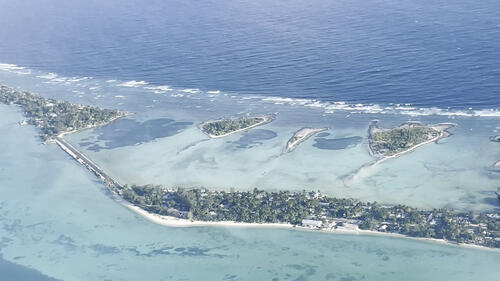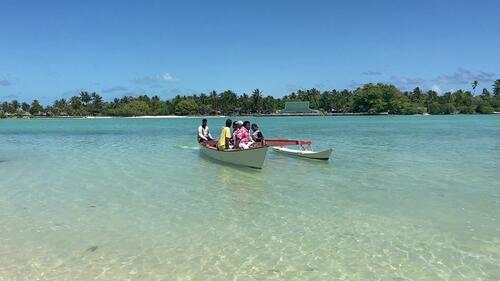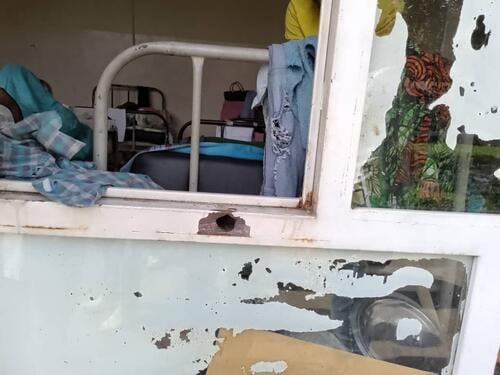Médecins Sans Frontières (MSF) officially launched medical activities in the equatorial Pacific island nation of Kiribati in October 2022. Our team there, including a paediatrician, midwife and general practitioner, support the Ministry of Health and Medical Services to improve maternal and neonatal health outcomes.
Kiribati is the only country in the world to touch all four hemispheres. The 32 atolls (and one raised coral island) lie between Australia and Hawaii and collectively cover just 811 square kilometres of land in a vast ocean area of 3.5 million square km. Some eastern islands take a week to reach by boat from the main island, and if not for a tweak to the international date line, would be 24 hours behind.
It is fascinating, beautiful, and troubled. Half of Kiribati’s total population (estimated at 120,000) live in the capital, South Tarawa. Slim strips of land shaped like a boomerang, the main island can barely accommodate all the people.
Kiribati has one of the highest burdens of disease in the world... one of the highest of TB and diabetes; and some of the lowest access to basic healthcare. There are clear needs here that are not being met.Alison Jones, MSF’s medical coordinator for Kiribati
A result of a brisk birth rate (26 births per 1,000 people), and urbanisation on South Tarawa due to migration from outer islands, overcrowding exacerbates health and social problems and environmental issues.
“Kiribati has one of the highest burdens of disease in the world, including the highest incidence of leprosy, one of the highest of TB and diabetes; and some of the lowest access to basic healthcare,” says Alison Jones, MSF’s medical coordinator for Kiribati. “There are clear needs here that are not being met.”
On top of that, the environmental issues are significant, and growing.
Among the most climate-vulnerable places on earth
The people of Kiribati (or i-Kiribati’s) fragile situation is threatened by a changing climate. The vast majority of households reported climate impacts back in 2016, with 81 per cent already directly affected by sea level rise.
Kiribati’s small land mass is particularly vulnerable to a rising sea - the highest point on Tarawa is just three metres above sea level.
Evidence of land shrinkage due to erosion is everywhere. In some places, uprooted trees lie where picnic spots and beaches once were. Homes are abandoned as the water comes closer and sandbags line the edges of the coast like chains of reinforcement. At a full moon high tide, waves crash across the main causeway and flood homes.
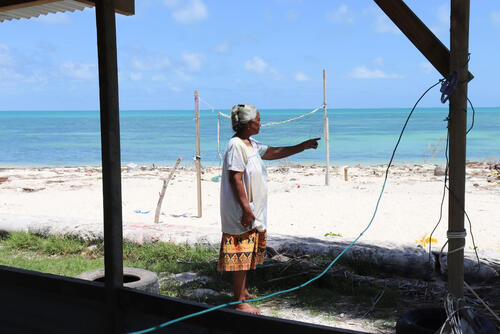
Along with erosion, the salinisation of underground water sources and soil, warmer air temperatures, more frequent ‘king tides’ and drought are increasing.
Another problem with shrinking land is the threat to agriculture. Most i-Kiribati are subsistence farmers, especially on the outer islands, but this has been declining in recent years.
Fishing has also been affected. With impact from overpopulation and climate to reef fisheries, coastal fisheries will soon not be able to meet food needs. Overall, Kiribati is estimated to need 50 per cent more food by 2030 to sustain the growing domestic demand.
Food insecurity is not only due to extreme weather; lifestyles are changing. Many young people no longer produce and prepare food in traditional ways but prefer the convenience of imported foods. Fresh produce is not widely accessible. A pumpkin can cost €20, and a watermelon €32 - well out of reach for most people, considering minimum wages are around €1 per hour. It is not surprising then, that almost all i-Kiribati miss out on the recommended servings of fruit and vegetables.
A move away from traditional diets of fish, babai (swamp taro), breadfruit and coconuts (with pork for special celebrations/parties) has implications for people’s health. The majority of people now eat white rice as a staple, with the addition of imported sugary drinks, as well as canned and processed foods.
It’s estimated that 38 per cent of men and 54 per cent of women are obese, while among children under age five, 25 per cent are underweight. Of the risk factors for non-communicable diseases (NCDs), 70 per cent of adults 18-69 have three or more.
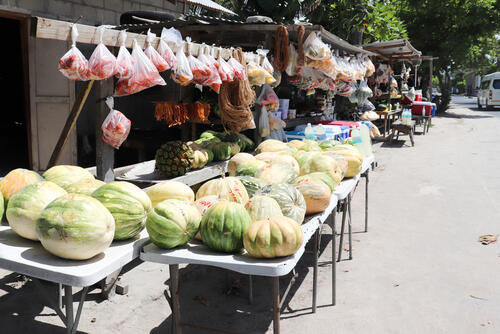
The climate crisis is a health crisis
Human health is dependent on the health and sustainability of the environment. Nowhere is this more evident than for people living within the constraints of an island.
“Here you see the collision of planetary health and non-communicable diseases that is unseen anywhere else,” says Dr Lachlan McIver, MSF tropical diseases and planetary health advisor.
McIver calls small island states the ‘canaries in the coalmine of climate change’.
Seventy-five percent of deaths in the Pacific region are due to NCDs, and NCDs are now recognised as the leading cause of health problems in Kiribati.
The rates of diabetes in Kiribati are high and increasing; among women aged 45-69, more than 44 per cent have diabetes.
In addition to a poor-quality diet, hypertension, lack of exercise and smoking contribute to these high rates of disease.
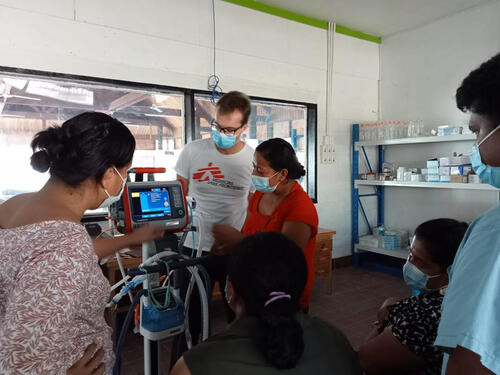
“Diabetes in pregnant women is of particular concern as the condition can be high risk for mums and babies, who require access to specialist care for management during labour, delivery, and after birth,” says Sandra Sedlmaier-Ouattara, midwife and MSF’s project medical referent in Kiribati.
MSF’s work in Kiribati aims initially to improve diabetes detection and management and hypertension related to maternal health in the Southern Gilbert Islands, based at Tabiteuea North.
Currently, high-risk pregnant women on the outer islands have limited access to specialist care and must leave their families behind to be flown to the capital Tarawa for specialist care until they deliver, and after, if needed.
“Our activities in the health clinics include improving antenatal care in general, with an additional focus on the early detection of diabetes and hypertension,” says Sedlmaier-Ouattara. “We also support labour and delivery and neonatal care at the Southern Kiribati Hospital.”
“To have long-term impact and for sustainability, our activities are focused on training and mentoring our midwife, nurse, and doctor colleagues,” she says.
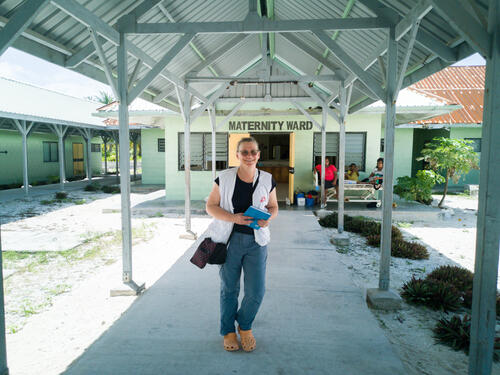
Other activities include working to improve newborn care in the first 24 hours of life through training midwives, nurses and doctors in the universal Helping Babies Breathe program, as well as treatment, in Tabiteuea North and Tarawa.
MSF will also support hospital infrastructure upgrades at the hospital on Tabiteuea North Hospital, such as providing renewable energy, clean water and waste management to support referrals and surgical capability.
Pacific islands are among the most climate-vulnerable places on earth. Kiribati is showing the rest of the world some of the most tangible impacts of climate change yet.



